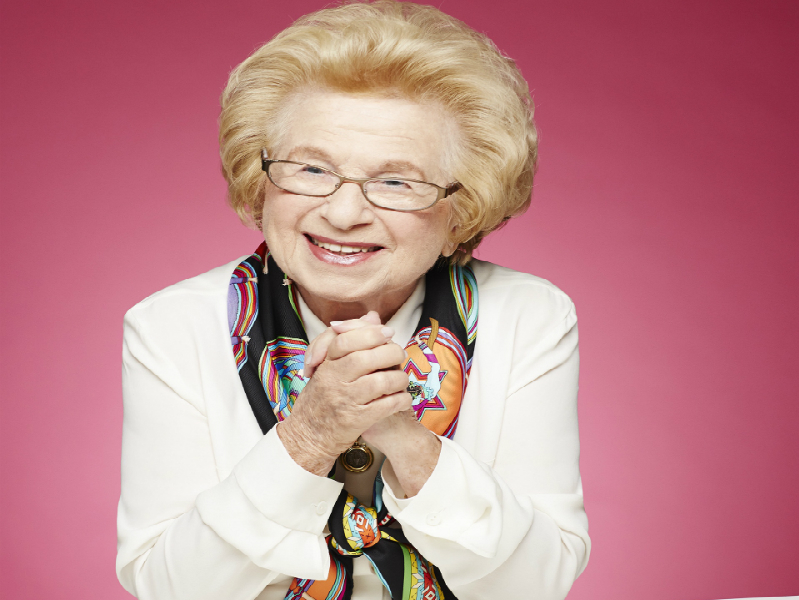Ruth Westheimer became a household name in the 1980s, when she burst onto the scene with her frank – often graphic – talk about sex and sexuality. Known as “Dr. Ruth,” she became a media staple as a sex therapist and educator. She smashed taboos, but for many, the topic seemed discordant coming from a diminutive Jewish grandmother. The author of 44 books, Dr. Ruth, 90, shows no signs of slowing down.
She was born Karola Ruth Siegel near Frankfurt, Germany, in 1928 and witnessed the events of Kristallnacht, as well as her father’s arrest by the Gestapo. Sent via the Kindertransport to live in Switzerland at a school that later became an orphanage, her whole family perished in the Holocaust.
After the war, she went to Palestine, lived on a kibbutz and became a sniper for the Haganah, the forerunner of the Israel Defence Forces, nearly losing her legs in a bomb blast in the 1948 War of Independence.
She later studied at the Sorbonne in Paris and, in 1956, immigrated to the United States, where she earned a doctorate from Columbia University’s Teachers College, and developed a passion for sexual education.
On Nov. 1, she’s opening this year’s Holocaust Education Week with a talk at the Toronto Centre for the Arts.
What will you be talking about in Toronto?
I’ll be talking about my new children’s graphic novel, which is a little autobiography about me, called Rollercoaster Grandma, for children eight through 12. I did that to stand up and be counted. Because, as you know, there are Holocaust deniers and there’s a lot of people who say there’s Holocaust fatigue, that we should stop talking about it because it happened a long time ago. So I need people to know not to forget. And I would like good questions from the people who attend.
What do you consider to be a good question?
Any question is a good question.
In Ontario, we’re struggling with how to educate school-aged children in matters of sex and sexuality. What role do schools play in sex education?
We just have no choice in today’s world, with the Internet. Parents have to be “askable,” and schools have to help, so that children grow up knowing about issues of sexuality. I don’t do politics. However, girls have to know about menstruation because girls these days menstruate at an earlier age. Boys and girls must know about menstruation and about nocturnal emissions, so that they grow up knowing. Parents have to be “askable,” so that children know they can ask their parents questions, and schools have to play a role.
What do you feel is the most harmful misconception about sex among young people?
I don’t have just one thing to say about that, but I have to say that in today’s world, with all the information available on the Internet, there’s just no way that we can put our heads in the sand and not talk about the issues.
Judaism has much to say about sex and gender roles …
I wrote a book about sexuality and the Jewish tradition called Heavenly Sex: Sexuality in the Jewish Tradition. I’ll talk a little about that in Toronto.
What’s your main takeaway of the intersection of Judaism and sexuality?
That for Jews, sex has never been a sin between a husband and his wife. It always has been a mitzvah and an obligation.
And outside marriage?
No way!
What influence on your life did your time as a sniper in the Haganah have?
I was there for a very short period of time and it wasn’t an act of heroism. All of us were, in some part, in service to the creation of Israel. I was badly wounded – I’ll talk about that, too – from shrapnel in Jerusalem on both legs. But I was lucky. There was a brilliant German-Jewish surgeon who fixed me. I learned to walk again. And I was a super-good skier on difficult black diamond runs. And I could dance the whole night, when I found a good partner.
In the Jewish tradition, it says that a lesson taught with humour is a lesson retained. And I use that a lot. I don’t tell jokes and I hear jokes every day. I don’t remember them, but I can use humour in my teaching.
You refer to yourself as an orphan of the Holocaust, not a survivor. Can you explain?
I was in a Swiss children’s home that became an orphanage. I was not in a camp. My whole family was in concentration camps, but I was not, so I call myself an orphan of the Holocaust.
READ: LULLABIES FROM THERESIENSTADT AT HOLOCAUST EDUCATION WEEK
Is there anything that surprises you today about relationships? Does anything shock you?
Yes. These days, I’m very concerned about loneliness and about people not being able to commit. And I’m also very concerned – I’ll talk about it – that because of the Internet and iPhones, the art of conversation is going to be lost. We have to talk about that, because you go into a restaurant and you see the whole family on their iPhones, rather than communicating with each other.
This interview has been edited and condensed for style and clarity
